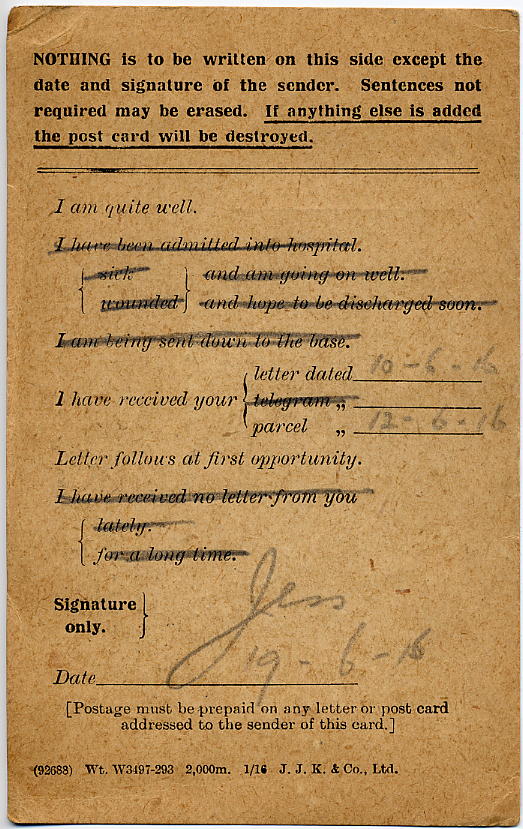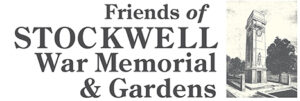
Jesse William Goff. Photos © Sue and Ron Falder
P. W. Goff (erroneously given for J.W. Goff)
Service no. 300319
Rifleman, London Regiment (London Rifle Brigade), 1st/5th Battalion
Born in Clapham; enlisted in London; lived in Clapham
Killed in action on 1 July 1916 (the first day of the battle of the Somme), aged 19
Remembered at Thiepval Memorial, Somme, France
Jesse William Goff is consistently misnamed as P.W. (Percy William Goff) – in his Army records, on his medals cards, in the Commonwealth War Graves Commission database, on the Thiepval Memorial and at Stockwell War Memorial. Why this should be is still a mystery to his descendants. The family have his medals and death plaque – they give his Army number so there is no question that this is the correct man.
Information from the 1911 census
In 1911 the Goff family lived at 63 Chelsham Road, Clapham, where they had seven rooms. Jesse William Goff, then 13 and an only child, lived with his father, William Percy Goff, 43, a prudential assurance agent from Poole, Dorset, and Grace Mary Goff, 38, an assistant mistress at a London County Council school. There was a boarder, Frank Cutten, 28, a compositor from Chichester, Sussex.
Sue and Ron Falder have sent the photo of Jess, above, and the text of two letters he wrote to his Aunt “Op” (Annie Margaret Carroll (nee Williams) Jesse’s mother’s sister, who is Sue Falder’s grandmother, at 42 Risingholme Road, Weald Village, Harrow, Middlesex.
They provide a vivid portrait of the hard work required at the front, and of the dry good humour life there brought to the surface. He sounds both hard-working (“hard work and fresh air”) and sweet-natured in his expressions of affection for his young cousin Molly and the newborn baby.
The first letter is dated 28 May (1916). He mentions the fact that Jim (Op’s husband) may be called up. By January 1916 compulsory conscription was in place. It applied to unmarried or widowed men between 18 and 41, but on 25 May 1916 married men were included. Those in trades that were considered vital to the war economy – the so-called “starred occupations” – were exempt. I am not sure who “our boss” mentioned in the letter is, but it could be Jess’s sardonic description of his own mother.
Sue and Ron Falder have sent the photo of Jess, above, and the text of two letters he wrote to his Aunt “Op” (Annie Margaret Carroll (nee Williams) Jesse’s mother’s sister, who is Sue Falder’s grandmother, at 42 Risingholme Road, Weald Village, Harrow, Middlesex.
They provide a vivid portrait of the hard work required at the front, and of the dry good humour life there brought to the surface. He sounds both hard-working (“hard work and fresh air”) and sweet-natured in his expressions of affection for his young cousin Molly and the newborn baby.
The first letter is dated 28 May (1916). He mentions the fact that Jim (Op’s husband) may be called up. By January 1916 compulsory conscription was in place. It applied to unmarried or widowed men between 18 and 41, but on 25 May 1916 married men were included. Those in trades that were considered vital to the war economy – the so-called “starred occupations” – were exempt. I am not sure who “our boss” mentioned in the letter is, but it could be Jess’s sardonic description of his own mother.
My Dear Op,
I have just got your address from Ma.
I was going to write before but I could not remember the name of your street. I remembered the number of the house that was all.
Well I am out here again & very near where I was before in fact we pass some of our old billets daily.
It is rather warmer than before in more ways than one. Nevertheless by dint of hard work & fresh air we manage to keep ourselves alive & fit. Mind you it’s not all cakes & ale but our various little “grouses” would fill a book.
We go out & work every day with picks & shovels just like navvies (the only difference is that the latter get about three times the pay). Sometimes we get a little shelling or “strafing” sometimes not, usually the former but we have managed without any casualties so far. Our week usually consists of seven days (working) & after a lengthy discussion today we have come to the conclusion that the man who could put forward an invention that would get another 24 hrs out of a week, would make his fortune.I have heard from Ma about Uncle “Jim” & the “garrison duty abroad” business. Really I should not think that he would be called up at all. I’m sure I don’t know how our “boss” will get on if the age limit extends much more. But I must not express my own views on the subject as this epistle has to pass through other hands.
“Let’s” hope it will be all over soon.
Shall be pleased to hear from you when you can spare the time. Hope you are all well: I am quite fit. Love to both of you. Lot’s of kisses for Molly and I can only say “the other”. I do not know the name or sex.
Anyhow just mention that “he or she” has got a cousin.
Yr Loving Nephew, Jess.
The second letter was written on Friday 23 June, just a few days before he was killed, on 1 July 1916. He mentions the “official P.C. [postcard]”, shown left.
My dear Op & Jim
Thanks very much for your letter and parcel. Many of us enjoyed the contents. As a matter of fact it arrived at a most opportune moment – we were in the trenches.
That is the reason I was unable to write there and then, but I hope you received the official p.c.
We had a rather rough time up there but are very now resting (& very glad too).
Really there is next door to no news. One cannot say everything & – well all that remains is I am quite well and the weather has not been at all good.
We see rather more life & more grub now since we have left the “navvies”. I don’t think anyone was very sorry to leave.
By the way I’m afraid I’m putting the cart before the horse. I don’t think I told you that we moved and are now with our regiment.
My address for the future will be No. 255 A Coy. London Rifle Brigade B.E.F. France.
Now I’m afraid that is all.
Best of love to Molly & the new arrival.
Y. Loving Nephew Jess

